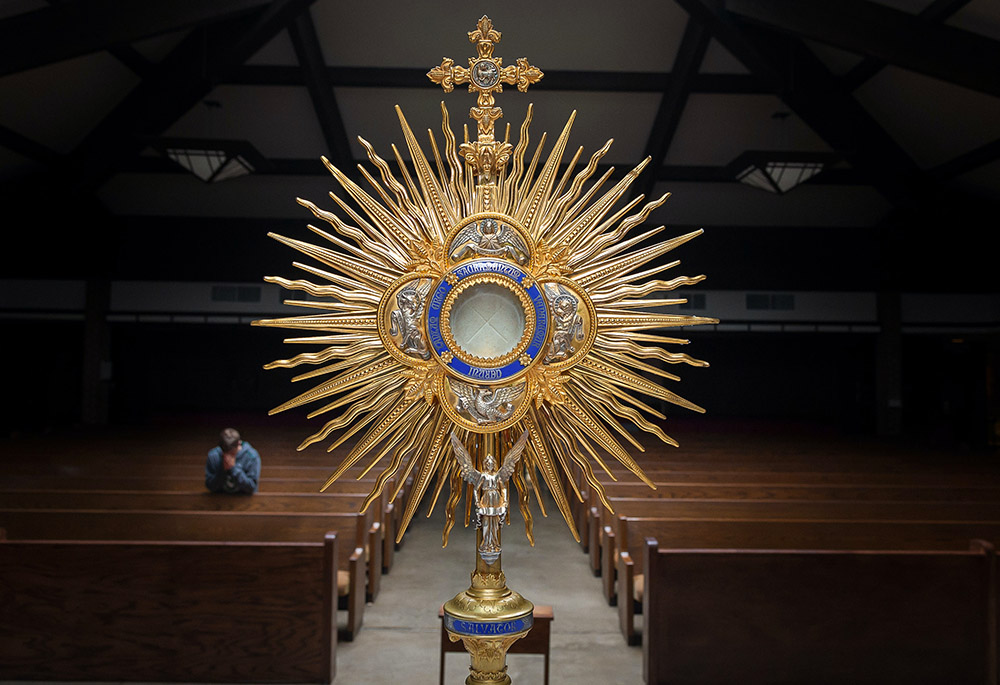
A monstrance holds the Eucharist at a church in Colorado. (Unsplash/Josh Applegate)
To organize a National Eucharistic Congress in 2024, the Catholic bishops in the United States have partnered with an event planner who was accused of charging exorbitant rates during the preparations for Donald Trump's presidential inauguration in January 2017.
The bishops are also relying on conservative Catholic organizations to provide funding and create catechetical and promotional materials for a multiyear National Eucharistic Revival that will lead up to the four-day congress in July 2024. The bishops intend to set up a nonprofit organization to handle logistics and raise $28 million over the next two years to hold the event in downtown Indianapolis.
Some Catholic observers, including experts in financial planning and church management, say the bishops' plan is sound and consistent with other large religious events in recent years, including the 2015 World Meeting of Families in Philadelphia.
Also linking belief in the real presence of Jesus in the Eucharist to regular Mass attendance and active church participation, those observers think the bishops are on the right track.
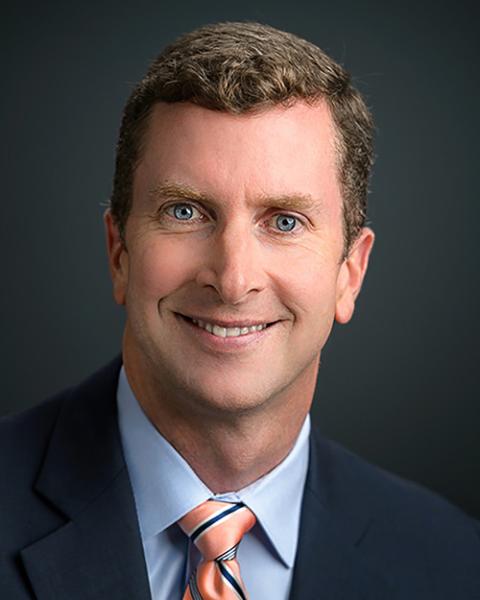
Matthew Manion (CNS/Courtesy of Villanova University)
"This should be the kind of thing we can all unite around. If we can't unite around the Eucharist, and Jesus' presence in the Eucharist, I don't know what we can unite around," Matt Manion, director of the Center for Church Management at Villanova University, told NCR.
But some other liturgists, sacramental theologians, lay Catholics involved in church reform movements, and clergy abuse survivor advocates question the revival's premise, its price tag and the prelates' motives.
"You had low Mass attendance long before COVID that coincided with finance and sex abuse scandals. But the bishops think [confusion about] the Eucharist is the cause for the disaffection? Really?" asked Donna Doucette, the executive director of Voice of the Faithful, a reform group formed in the aftermath of the revelations of clergy abuse in the Boston archdiocese in 2002.
Jesuit Fr. John Baldovin, a professor of historical and liturgical theology at Boston College's School of Theology and Ministry, told NCR that previous public opinion polls, including an oft-cited August 2019 Pew survey, do not support the argument that emphasizing the Real Presence will draw fallen-away Catholics back to church.
"The real question, I'd say, is not exactly the Eucharist," Baldovin said. "It's the credibility of Catholicism."
The price tag
To organize the July 2024 National Eucharistic Congress, which they hope will attract up to 80,000 attendees, the bishops are partnering with Hargrove, an event-planning company based near Washington, D.C., that has been involved in previous papal events. Hargrove has organized annual meetings for the World Bank and International Monetary Fund, major gatherings like the Democratic National Convention, and has been involved in producing events for every presidential inauguration since Harry Truman's in 1949.
Hargrove was paid at least $25 million for Trump's inauguration, CNN reported in 2019. CNN also reported that internal emails showed that event planners for Trump's inauguration raised questions about Hargrove's prices. One planner reportedly said Hargrove's bid to decorate two halls of a convention center was "literally five times anywhere else would be." The Wall Street Journal reported that one planner complained about Hargrove's "excessively high prices for labor, centerpieces and even bike racks."
'It's a whole lot of money when you put it all together, but when you break down what's actually happening, all these people will be coming together for this incredible experience.'
—Bishop Andrew Cozzens
Hargrove did not immediately return a message from NCR seeking comment about its pricing. Bishop Andrew Cozzens of Crookston, Minnesota, told NCR that last year the bishops put out a request for proposals from event planning companies. He said Hargrove's proposal was the most detailed.
"They understood the particular aspects that we needed," said Cozzens, who is the point man for the eucharistic revival and congress as the chairman of the bishops' Committee on Evangelization and Catechesis.
In a video posted in January on the website of the U.S. Conference of Catholic Bishops, Cozzens said the eucharistic revival — which is to begin this year on June 19, the feast of Corpus Christi — and the congress in 2024 are "central to the mission of the church in the United States right now." He told NCR that the initiative is a "foundation piece" in the bishops' plan to rekindle eucharistic devotion among the Catholic faithful.
"We need an initiative like this to help us bring that about," Cozzens said.
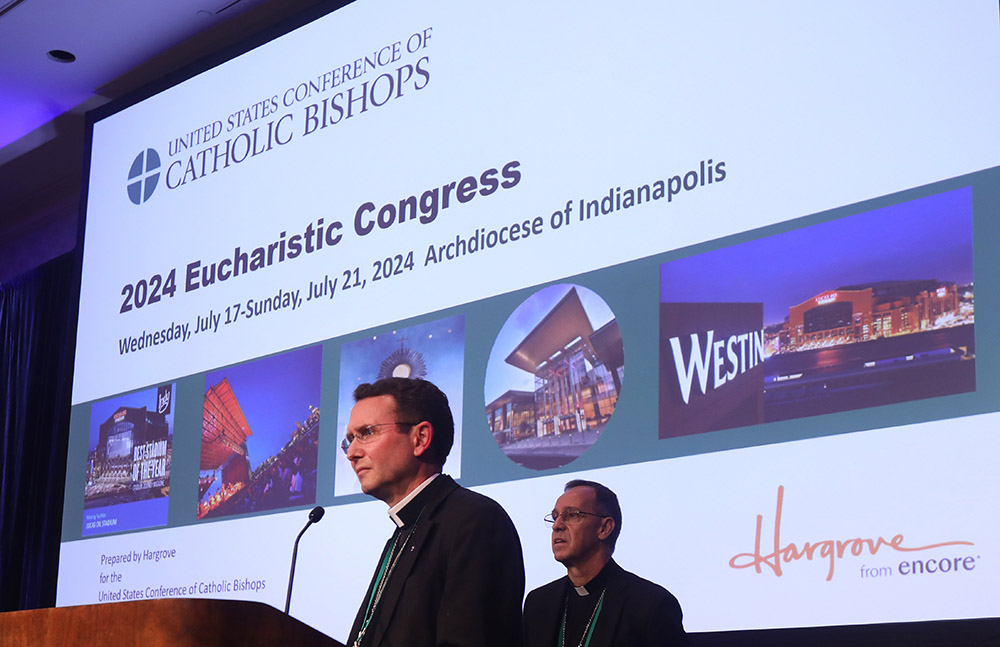
Bishop Andrew Cozzens listens to a question during a Nov. 17, 2021, session of the fall general assembly of the U.S. Conference of Catholic Bishops in Baltimore. (CNS/Bob Roller)
Arguably the most difficult aspect for the bishops in marketing their project is the congress' estimated $28 million budget. That figure prompted Archbishop Timothy Broglio of the U.S. Military Services to ask Cozzens at the conference's fall 2021 general assembly how the bishops could successfully market an initiative with a price tag that would seem "scandalous" to many Catholics.
"That's my budget for four years for the archdiocese, and I would imagine in much smaller dioceses, that probably represents much more," Broglio said.
Breakdown of biggest expenses
Cozzens acknowledged to NCR that $28 million was "a lot of money," though he suggested that "the spiritual fruits will be worth the investment."
"It's a whole lot of money when you put it all together," he said, "but when you break down what's actually happening, all these people will be coming together for this incredible experience."
A breakdown of the estimated budget for the eucharistic congress that Cozzens presented to the bishops last November indicates that the biggest expenses stand to be:
- $9.945 million for audio-visual production and programming;
- $4.545 million for the general service contractor that will assemble the staging, build sets and provide decor elements, among other services;
- $2 million for electricity and internet;
- $1.385 million for event management;
- $1.039 million for use of the venues, Lucas Oil Stadium and the Indiana Convention Center.
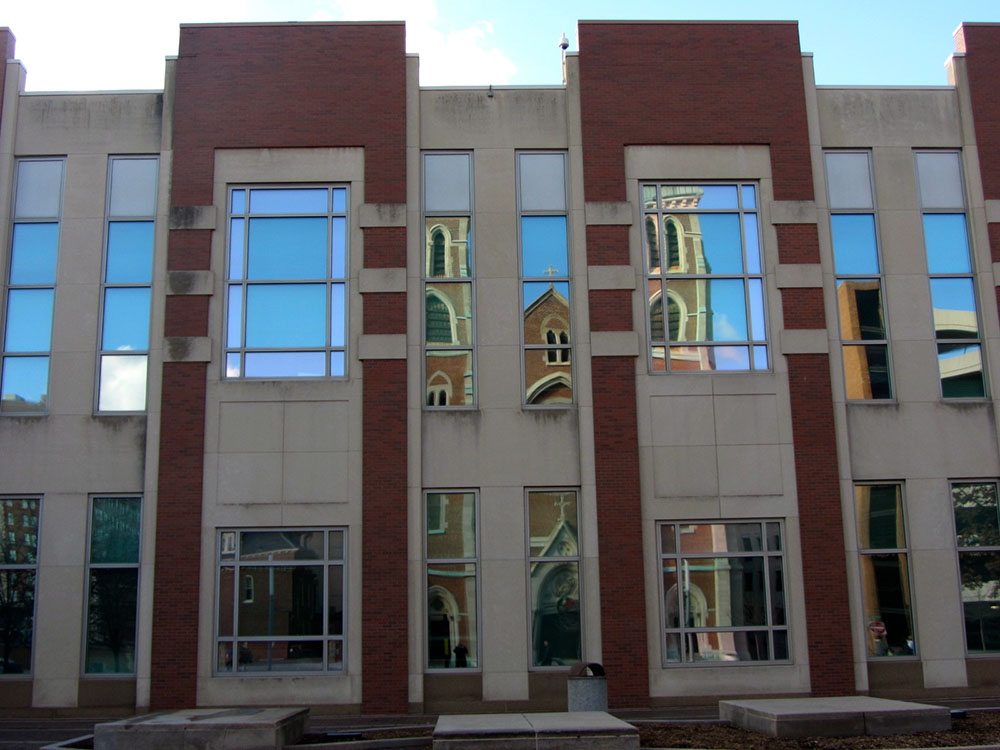
St. John the Evangelist Catholic Church is reflected on windows of the Indiana Convention Center in downtown Indianapolis. (Flickr/Richie Diesterheft)
Other significant expenses include $700,000 for marketing and promotional materials; $650,000 for entertainment; $150,000 to shuttle bishops, their staff and VIPs from their hotel to the venues; and $800,000 for security.
The bishops' plan envisions that a majority of the operating expenses — about $18 million — will be covered by at least 60,000 attendees, each paying a fee of $300 to $350, with the remaining $10 million to be paid by donations and the event's sponsors. Some of the money raised will also be used for scholarships to help lower-income people attend the event, Cozzens told NCR.
The congress will take place during the height of the 2024 presidential campaign season. The Democratic and Republican nominating conventions are usually held during the summer.
'If we can't unite around the Eucharist, and Jesus' presence in the Eucharist, I don't know what we can unite around.'
—Matt Manion
Bishop William Muhm, an auxiliary for the Archdiocese of the Military Services, suggested last November that the bishops' conference reach out to both political parties to ask that they not schedule their conventions the same week as the eucharistic congress, to not make it appear that the bishops were trying to "politicize" the Eucharist.
Cozzens replied at the time that he wasn't sure how much influence the bishops would have with either party scheduling its convention.
'Complex and expensive projects'
To "organize, plan and fully execute" the event, Cozzens told the bishops' conference, they will soon establish a new 501(c)(3) nonprofit organization that will handle the "substantial fundraising" and carry the insurance liability for the event. He noted the nonprofit will need to hire staff and could possibly continue after the congress.
That approach is similar to how the Philadelphia Archdiocese prepared for the World Meeting of Families, a five-day event in September 2015 that drew approximately 20,000 people from 100 different countries. The archdiocese set up a nonprofit in 2012 that over three years raised at least $42 million, tax documents show. In its first two years of activity, the nonprofit had a full-time paid staff with salaries totaling more than $1 million. In its final year, the nonprofit didn't have any paid staff and distributed its remaining assets to the archdiocese.
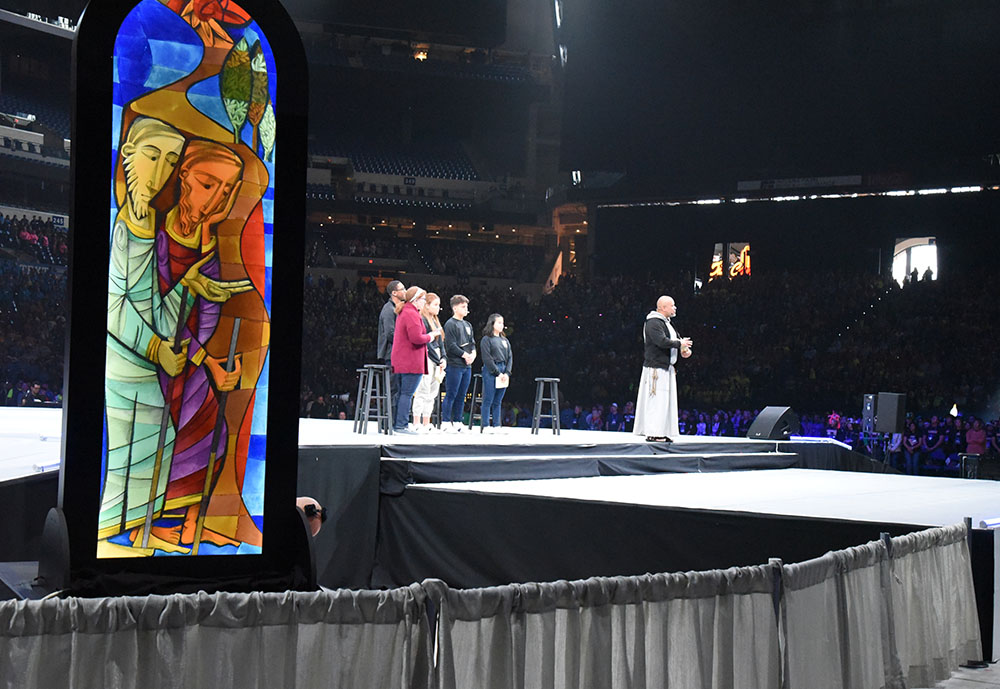
The National Catholic Youth Conference holds an event Nov. 22, 2019, at Lucas Oil Stadium in Indianapolis. (CNS/The Criterion/Sean Gallagher)
By comparison, the National Federation for Catholic Youth Ministry in 2019 had a $3.28 million budget for its biannual National Catholic Youth Conference, which was held that year at Lucas Oil Stadium. About 20,000 young people attended that event, which generated about $4.7 million in total revenue, according to the federation's 2019-20 financial report.
Manion, from the Center for Church Management at Villanova University, said creating a nonprofit to handle a large event like a National Eucharistic Congress makes sense in that it doesn't pull resources from other activities in the bishops' conference budget.
"There are certain reporting requirements from a transparency standpoint that I think would also be healthy as opposed to this getting buried in the budget of the U.S. Conference of Catholic Bishops and no one really knowing what it costs," Manion said.
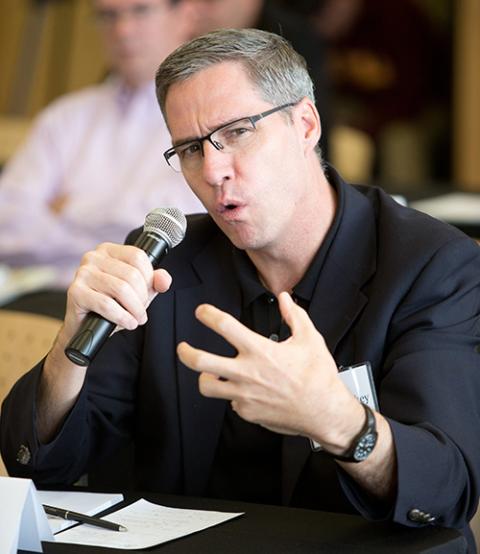
Patrick Markey (CNS/Courtesy of Leadership Roundtable)
Patrick Markey, the managing partner for the National Leadership Roundtable on Church Management, told NCR in an email that large initiatives like a National Eucharistic Congress "are complex and expensive projects."
"It is a long-standing best practice to ensure that the financial aspects of such undertakings are transparent to the public, open for scrutiny, and that those in charge are accountable to donors and other stakeholders for financial decisions," Markey said.
Tough sell despite promises
Despite the promises of best practices, transparency and spiritual returns on investment, the scope and expense of the eucharistic revival and national congress remain a tough sell to many observers.
"They'd be better off putting that money into improving the quality of the celebration of the Eucharist, and of preaching. Then you'd have something to work with," Baldovin of Boston College said.
Deborah Rose-Milavec, co-director of FutureChurch, an organization that advocates for reforms in church governance and practice, said, "To put that kind of money into a revival for [the bishops'] image and their authority is a really sad chapter in a very long history of this group of bishops leading the church wrongly."
Terence McKiernan, co-founder of BishopAccountability.org, a website that tracks the bishops' response to clergy sex abuse scandals, told NCR he believes the $28 million expense will be "galling" for clergy sex abuse survivors, unless the bishops act concretely in the next couple of years to prove they stand with survivors.
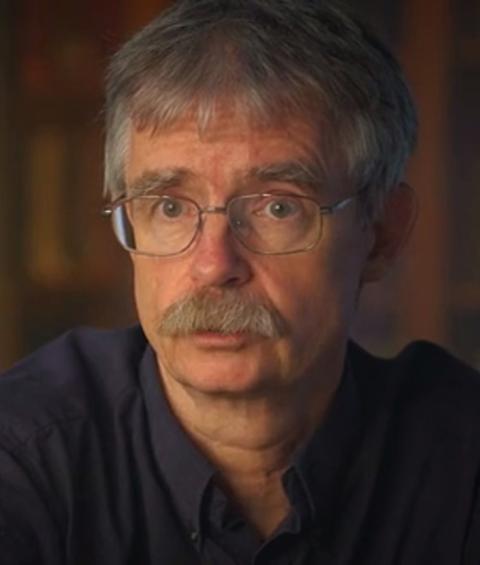
Terence McKiernan (Courtesy of Terence McKiernan)
"The last thing you want is for a celebration of the Eucharist to look like conspicuous consumption at the expense of survivors," McKiernan said.
Though adding that $28 million can be seen as an investment, Manion said it is still "a huge price tag."
"I could also look at the $28 million budget and say, 'That's the budget for 100 schools in the Archdiocese of Philadelphia,'" Manion said. "I think all those things are fair questions to ask."
Conservative-leaning donors
To cover expenses, the bishops have thus far been relying on in-kind donations and sponsorships from conservative-leaning Catholic groups.
In January, the bishops launched a website for the revival, which Cozzens said in November was made possible by a $1.2 million in-kind gift from Formed, an online Catholic streaming and multimedia platform developed by the Augustine Institute, a conservative Colorado-based nonprofit that is also sponsoring the eucharistic congress.
The Knights of Columbus, the fraternal organization for Catholic men that has increasingly become active in conservative partisan politics in recent years, is also sponsoring the initiative. Cozzens told the bishops last November that the Knights are helping to produce "eucharistic procession tool kits" and has provided a grant to develop a national advertising strategy for the revival.
'They'd be better off putting that money into improving the quality of the celebration of the Eucharist, and of preaching. Then you'd have something to work with.'
—Jesuit Fr. John Baldovin
Cozzens also said in November that Our Sunday Visitor, the Indiana-based Catholic publishing company, will publish a tract on eucharistic belief and practices for the revival, and has offered a $1 million donation for the initiative.
The McGrath Institute for Church Life at the University of Notre Dame is providing funding for a new survey that the Center for Applied Research in the Apostolate at Georgetown University will conduct on Catholic eucharistic beliefs. In the run-up to the planning for the eucharistic revival and congress, several bishops often cited a 2019 Pew Research Center survey that purported to find that only about a third of U.S. Catholics believed in the real presence of Jesus in the Eucharist.
But religious scholars cautioned about reading too much into that survey, adding that the options respondents were given did not reflect the complexity of Catholic teaching on the Eucharist.
Advertisement
Acknowledging that "there were some problems" with the Pew survey, Cozzens said in November that the bishops commissioned the CARA survey to get at the "deeper issues" pertaining to Catholic beliefs in the Eucharist.
Mark Gray, the director of CARA Catholic Polls, told NCR that he and his team of social scientists are working with sacramental theologians to craft a survey that will include open-ended questions for Catholic respondents to explain more fully what they believe about the Eucharist at the moment of consecration.
"We felt that some of the existing questions in surveys, which are sometimes asked of all Christians and not just Catholics, use wording that may not necessarily fit what the church teaches," Gray said.
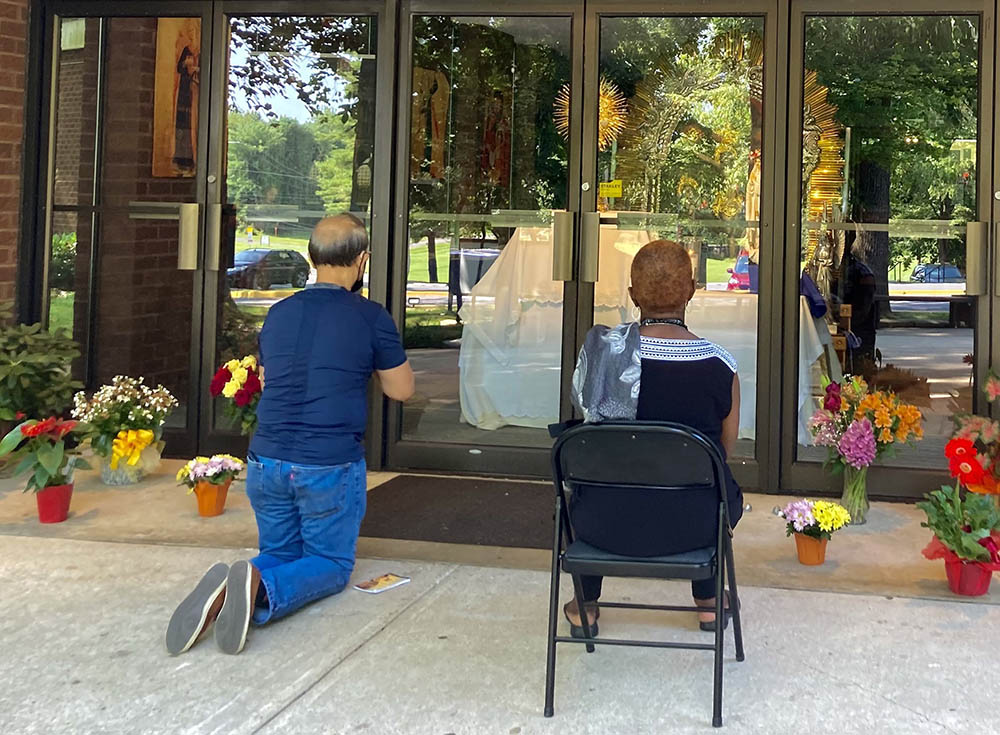
Two people pray before the Blessed Sacrament Aug. 11, 2021, at an adoration chapel, modified during the coronavirus pandemic, at St. John Neumann Catholic Church in Gaithersburg, Maryland. (CNS/Carol Zimmermann)
Gray added that the most-cited reasons in surveys for why Catholics do not attend Mass are often scheduling conflicts, family obligations and a sense, especially among younger adults, that it is not sinful to not attend Mass.
"Very rarely is it any of the hot-button issues," Gray said. "It's these mundane, everyday things."
Getting Catholics back in the pews
Placing Mass attendance back on the priority list for most American Catholics, by emphasizing the Eucharist, is the bishops' strategy to get them back into the pews. In his NCR interview, Cozzens linked fostering eucharistic devotion with promoting Pope Francis' "culture of encounter."
"That culture of encounter is both the culture of encounter with each other and the encounter with the Lord that happens in the Eucharist," Cozzens said. "That culture of encounter can change and transform us, even when we find ourselves discouraged or even hurt by the church."
However, those involved in church reform and accountability groups argue that the various scandals related to clergy sex abuse, financial wrongdoing and the partisan culture war postures of some bishops and priests, among other issues, have more to do with American Catholics being estranged from their religion.
'You can take any person in the world, except a bishop apparently, and pose these questions to them about what they think might be the more likely cause of people not attending Mass, and I'm pretty sure only a bishop would choose the Eucharist.'
—Donna Doucette
"For Catholics who have experienced hurt and marginalization, this revival and eucharistic congress are going to do nothing to heal those wounds. In fact, they will probably rip them wide open," said Russ Petrus, the other co-director of FutureChurch.
"You can take any person in the world, except a bishop apparently, and pose these questions to them about what they think might be the more likely cause of people not attending Mass, and I'm pretty sure only a bishop would choose the Eucharist," said Doucette of Voice of the Faithful.
Doucette noted that the bishops are using their new document on "eucharistic coherence" as a resource for the revival. The document, titled "The Mystery of the Eucharist in the Life of the Church," originated from a special working group the bishops' conference created in response to the November 2020 election of President Joe Biden, a Catholic politician who supports abortion rights.
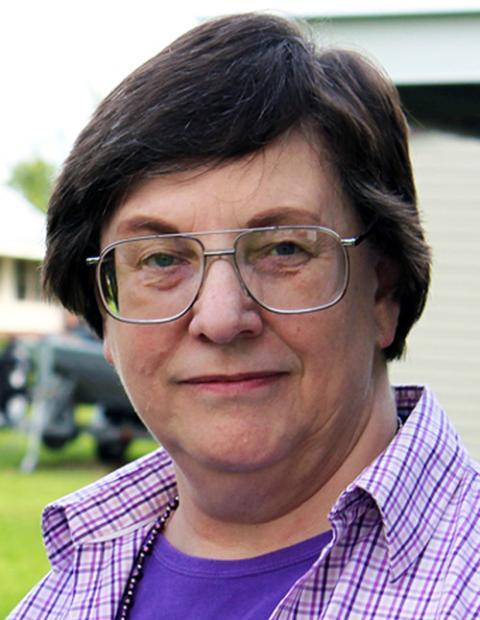
Donna Doucette (CNS/Courtesy of Donna Doucette)
"It seems to me this grew out of an attempt from the [bishops] to pit the U.S. Catholic Church against the political administration coming into power," Doucette said. "And when that failed, they had to save face by doing something else."
Others note that bishops across the country have shuttered financially struggling parishes and Catholic schools in recent years. They also point out that some prelates have tried to shield church assets from settlements with clergy sex abuse survivors.
"I think the $28 million is going to be really, really hard for survivors to take," said McKiernan of BishopAccountability.org. "The question is, are the bishops, as they plan all this, really going to take that objection seriously?"
Cozzens told NCR that he "has walked with" victims of clergy sex abuse who he said "experienced healing" through eucharistic adoration. The bishop said he understands the concerns about how the church spends money.
Cozzens added that spending money for evangelization "is also a good thing" to do for an initiative he argues will lead to transformed lives and help heal divisions and pain that people in the church are experiencing.
"This is about a renewal of the eucharistic life of the church, which Vatican II said was supposed to be the heart of our life," Cozzens said. "As we invite people to pray about that, and to enter more deeply into it, we hope their hearts will be transformed so that they might be part of the healing of our world."








